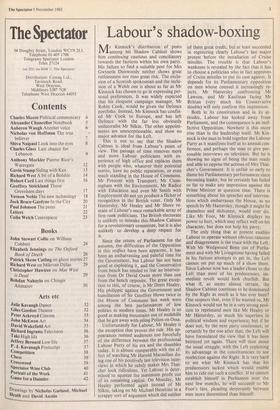Labour's shadow-boxing
Mr Kinnock's distribution of posts among his Shadow Cabinet shows him continuing cautious and conciliatory towards the factions within his own party. His failure to find a suitable post for Mrs Gwyneth Dunwoody neither shows great ruthlessness nor runs great risk. The exclu- sion of a Scottish spokesman and the inclu- sion of a Welsh one is about as far as Mr Kinnock has chosen to go in expressing per- sonal preferences. It was widely expected that his eloquent campaign manager, Mr Robin Cook, would be given the Defence portfolio. Instead, Mr Kinnock has confin- ed Mr Cook to Europe, and has left Defence with the far less obviously unilateralist Mr Silkin. The other appoint- ments are unexceptionable, and show no major advance for the Left.
This is not to say that the Shadow Cabinet is ideal from Labour's point of view. The passage of time removes more and more Labour politicians with ex- perience of high office and replaces them with people who, whatever their potential merits, have no public reputation, or even much standing in the House of Commons. Mr Prescott with Transport, Mr Cunn- ingham with the Environment, Mr Radice with Education and even Mr Smith with Employment do not yet produce a flicker of recognition in the British voter. Only Mr Hattersley, Mr Healey and Mr Shore re- main of Labour's once remarkable array of first-rank politicians. The British electorate is unlikely to mistake this Shadow Cabinet for a revolutionary committee, but it is also unlikely to develop a deep respect for it.
Since the return of Parliament for the autumn, the difficulties of the Opposition in this respect have been apparent. It has been an embarrassing and painful time for the Government, but Labour has not been good at exploiting it, and the Conservative front bench has tended to fear an interven- tion from Dr David Owen more than one from the bench opposite. The great excep- tion to this, of course, is Mr Denis Healey. His philippic against the Government and humiliation of Sir Geoffrey Howe twice in the House of Commons last week were among the best performances of low politics in modern times. Mr Healey is so good at making mountains out of molehills that he got away with piling Pelion on Ossa.
Unfortunately for Labour, Mr Healey is the exception that proves the rule. His ap- pearances remind audiences too forcefully of the difference between the professional Labour Party of his era and the shambles today. It is almost comparable with the ef- fect of watching Mr Harold Macmillan do- ing one of his positively last television inter- views in which he subtly makes Mrs That- cher look ridiculous. Yet Labour is deter- mined to squeeze the maximum profit out of its remaining capital. On Monday, Mr Healey performed again instead of Mr Silkin, taking on Mr Michael Heseltine in a scrappy sort of argument which did neither of them great credit, but at least succeeded in registering clearly Labour's last major• protest before the installation of Cruise missiles. The trouble is that Labour's weakness is revealed by the fact that it has to choose a politician who in fact approves of Cruise missiles to put its case against. It depends for its Parliamentary opposition
on men whose counsel it increasingly re- jects. Mr Hattersley confronting Mr Lawson, and Mr Kaufman facing Mr Brittan (very much his Conservative double) will only confirm this impression.
Both in its constitution and in its at- titudes, Labour has looked away from Parliament, and the consequence is an inef- fective Opposition. Nowhere is this more true than in the leadership itself. Mr Kin- nock is the man to hold together the Labour Party as it manifests itself at its annual con- ference, and perhaps the man to give per- sonable interviews on television. But he is showing no signs of being the man ready and able to oppose the actions of Mrs That- cher's Government. It is unfair so early to damn his Parliamentary performances since becoming leader, but he certainly has failed so far to make any impression against the Prime Minister at question time. There is something about his speeches and interven- tions which embarrasses the House, as no speech by Mr Hattersley, though it might be shameless and dishonest, would ever do. Like Mr Foot, Mr Kinnock displays no power to hurt, which may reflect well on his character, but does not help his party.
The only thing that at present enables Labour to operate without obvious rancour and disagreement is the truce with the Left. With Mr Wedgwood Benn out of Parlia- ment and with Mr Livingstone having failed in his furious attempts to get in, the Left cannot yet put up much of a show there. Since Labour now has a leader closer to the Left than most of his predecessors, im- mediate revolt would look churlish. But what if, as seems almost certain, the Shadow Cabinet continues to be dominated by the Right as much as it has ever been? One suspects that, even if he wanted to, Mr Kinnock would not be in a very strong posi- tion to reprimand men like Mr Healey or Mr Hattersley, so much his superiors in political wisdom and experience; but if he does not, by the next party conference, or certainly by the one after that, the Left will have formulated the view that it has been betrayed yet again. There will then ensue the usual struggle, with the Left exploiting its advantage in the constituencies to use reselection against the Right. It is very hard to see what Mr Kinnock has that his predecessors lacked which would enable him to ride out such a conflict. If he cannot establish himself in Parliament over the next few months, he will succumb to Mr Foot's fate, pleading desperately between men more determined than himself.














































 Previous page
Previous page